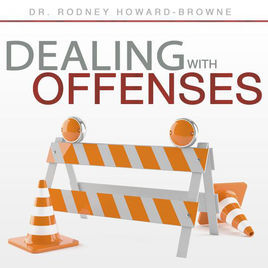Dealing With Offenses
- Paul W Hoffmaster
- Feb 11, 2018
- 3 min read

Every person has been offended sometime or other in their life. It may have been verbally, mentally, or even a physical incident. How we responded to those offenses is a good barometer of our spiritual maturity. Some of the offenses may have been relayed to us by second and third parties. For example, someone may tell (gossip) us what somebody else said about us. Sadly, sometimes we interpret what the messenger says as factual. We then begin to build up a case for rebuttal or even plan out an opportunity to reciprocate. The 70 times 7 rule (Matthew 18:22) is not applied due to what some believe is their obligation to give a rebuttal response. The "cheek turning" maneuver (Matthew 5:39) is rationalized away by claiming the other cheek will be exposed to more ridicule. It is only after their response has been administered that Christians settle back into spiritual complacency, but it does not end there. Sadly, some Christians file all offenses leveled against them in their memory bank. Periodically, their accounts are opened to remind them of past hurts. Some memories are so active that, even though an offense was experienced many years ago, every minute detail can still be remembered. Why is it that some Believers seem to have a more active memory bank than those who are not Believers? How do we handle direct one-on-one confrontation? Instead of second and third parties becoming involved, we should come face to face with the offender. Many times we falsely interpret the words as offensive due to our inconsistent spiritual walk. Sometimes in our daily routine, things are not going the way we would like and, as a result, our radar is in search of someone or something to draw attention off of ourselves.
How should we deal with offenses in our lives? The Bible makes it clear that if someone, particularly a fellow Believer, has offended us we have an obligation to address the offender in person. The Greek word for offend may also be interpreted sin. On the road to Damascus, Paul was confronted by Jesus and asked a simple question, "Why are you persecuting Me?" (Acts 9:4) Paul felt he was serving God by arresting and charging heretical followers of a false religion. Jesus was simply telling him that he was, in effect, persecuting Him. Whenever we release negative charges against our brothers and sisters in the Lord, we are actually doing it as onto the Lord! Simply put, when we initiate or pass on unsubstantiated remarks against someone, we are sinning! If we are on the other side of verbal innuendoes, we are to go to the offender and work to alleviate the flawed rhetoric. If there is no reconciliation, the offended should take two or three people with him to try and resolve the conflict. If that does not work, the next step is to bring the individual to the body of Believers (church) and hope for restoration. If that fails, fellowship is broken. (Matthew 18:15-17)
The problem is that some Believers choose to follow a different course of action when it comes to being offended. Too often these approaches only exasperate the situation. Ignoring offenses only causes the "seed of hurt" to fester in our minds. Eventually, the offense will reappear from the storage barn of the mind. Satan loves to bring up past hurts, and by our not dealing Biblically with those acquisitions, he will continue to water the seed of offense until it becomes a stumbling block to spiritual progress.
Whenever we sin, the Holy Spirit is there to question our action. It is very difficult for a Believer to offend Jesus by words and deeds and not be confronted by the workings of the Trinity. God will not let us violate His Word without challenging our behavior. Jesus will remind us through the Word that He is always cognizant of our behavior. The Holy Spirit will continue to convict us of carnal behavior. Every Believer needs to forgive those who offend them, and that is accomplished through offered reconciliation. Jesus forgives our offenses and expects us to forgive our offenders. When we are offended, let us seek communication with the offender, with the attitude of forgiveness. It is hard to forgive, but even harder to harbor resentment and bitterness.
Article Source: http://EzineArticles.com/expert/Paul_W_Hoffmaster/1351412
About Paul W Hoffmaster Been in the active Ministry for 46 years. BA Degree from Detroit Institute of Technology. Master of Divinity degree from Methesco Seminary. Served in Pastoral Ministry for 35 years in three major Denominations; United Methodist Church, Christian & Missionary Alliance and Assemblies of God. Spent over 20 years in both a Radio Ministry and as well as a Newspaper Columnist. Presently living in Indiana.
Article Source: http://EzineArticles.com/9874561
https://is1-ssl.mzstatic.com/image/thumb/Music/41/3e/e1/mzi.yqmzalde.jpg/268x0w.jpg




Comments